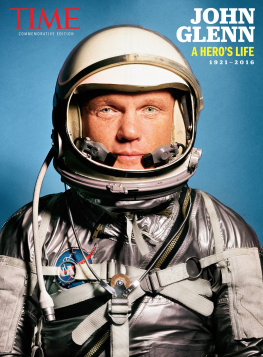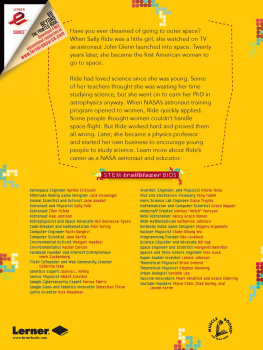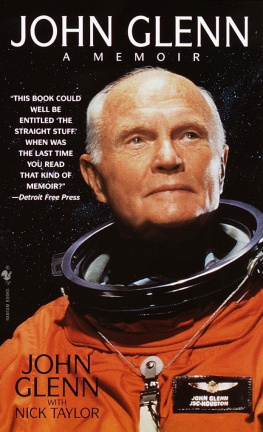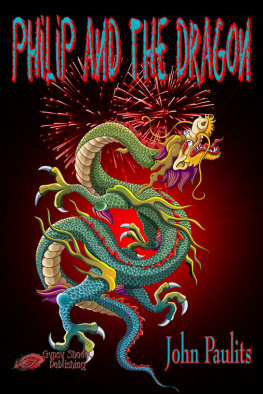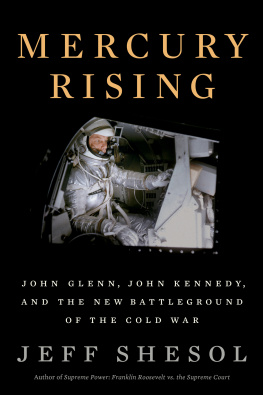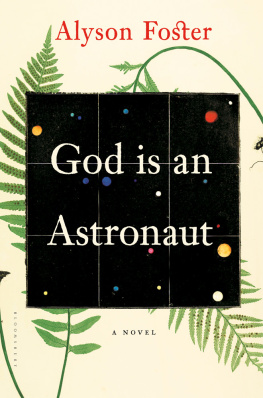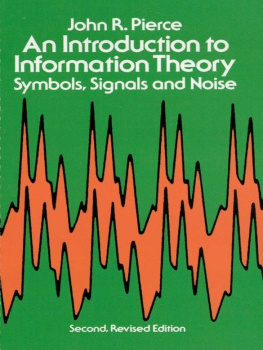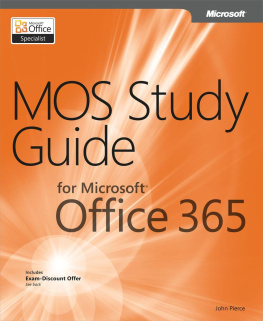This edition is published by Papamoa Press www.pp-publishing.com
To join our mailing list for new titles or for issues with our books papamoapress@gmail.com
Or on Facebook
Text originally published in 1962 under the same title.
Papamoa Press 2018, all rights reserved. No part of this publication may be reproduced, stored in a retrieval system or transmitted by any means, electrical, mechanical or otherwise without the written permission of the copyright holder.
Publishers Note
Although in most cases we have retained the Authors original spelling and grammar to authentically reproduce the work of the Author and the original intent of such material, some additional notes and clarifications have been added for the modern readers benefit.
We have also made every effort to include all maps and illustrations of the original edition the limitations of formatting do not allow of including larger maps, we will upload as many of these maps as possible.
JOHN H. GLENN
ASTRONAUT
BY
LT. COL. PHILIP N. PIERCE, USMC
AND KARL SCHUON
ONELift-Off!
IT WAS Tuesday, the twentieth day of February, 1962.
The sweep-second hand of the huge clock in the Missile Control Center seemed to pause at 9:46 A.M.
And the world stood still.
This is Mercury Control. T minus one minute and counting. All systems are reported in go condition. John Glenn is ready....
A tense hush fell over the crowded beaches surrounding the launching site at Cape Canaveral, Florida.
Children stopped their play.
Thousands of faces turned toward the stark orange skeletons of the missile gantries, towering above the palmettos a few miles away.
The stillness was broken only by the plaintive cry of sea gulls, wheeling in soaring arcs against the infinity of limitless blue sky.
In a large white mansion at 1600 Pennsylvania Avenue, in Washington, D.C., a man with a familiar shock of brown hair falling across his forehead stood in a sun-filled room. Arms folded across his chest, he stared intently at a television screen.
Scattered over the top of the massive desk behind him lay papers of state, bills of legislation, the documents of a great nationforgotten for the moment.
T minus fifty seconds...
Across the city, beneath the great dome of the Capitol, the halls of Congress stood empty.
Eight thousand miles to the west, in a simple dwelling beside the Nagara River, Koichiro Tanaka sat cross-legged on the straw tatami of his living-room floor. He, too, was waiting. Head cocked to one side, he strained to catch every word of staccato Japanese pouring from the ancient radio beside him.
It was almost midnighta late hour for a rice fanner with a long days work in the paddies ahead of him.
T minus forty seconds...
In Grand Rapids, Michigan, the Honorable John H. Vanden, presiding over a session of Circuit Court, banged his gavel. Court will recess for fifteen minutes.
Judge, jury, and defendant leaned forward in their chairs, eyes fixed on the evidence of the case before the courta stolen TV set.
Thirty seconds...twenty-nine...twenty-eight...
Now a rising note of urgency began to creep into the deliberate voice that tolled the ticking seconds.
In New Yorks Grand Central Station the bustling activity of the worlds busiest railroad terminal slowed. Dwindled to a trickle. Stopped. The booming speakers that normally filled the station with loud announcements of train arrivals and departures were strangely silent.
Under the lofty, vaulted ceiling of Grand Central, a solid mass of humanity stood transfixedfaces raised toward the giant television screen above the long rows of ticket windows.
Twenty-five seconds...
In northwest Rome, in a palace of a thousand rooms, a man born Angelo Giuseppe Roncalli knelt in prayer. John XXIII, Supreme Pontiff of the Roman Catholic Church, solemnly invoked the blessing of heaven on a red-haired American Protestant.
Seated in the attractive living room of her home in Arlington, Virginia, a dark-eyed housewife watchedand waited.
She had waited before.
Many times.
Now the fulfillment of the long months of work, the bright dreams of tomorrowand the waiting, were only seconds away.
This time, it had to be!
Twenty-four...twenty-three...twenty-two...
Staring at the image of the great silver rocket on the television screen, she saw only the face of the man she knew so wellwaiting in the tiny capsule high above the earth. The quick, easy smile was gone. Now it was an intent, serious, freckled face she saw beneath the hinged visor of the gleaming space helmet.
Please, dear God, let this be the timefor Johns sake
Now, in the charged atmosphere of the Control Center, barking voices swelled in the final racing chorus of the countdown. Tense, hurried words tumbled over each other in their frantic race against time.
Minus nineteen!
Speed is check.
Pressurization?
Go!
Motor systems?
I have a blinking, high-level light.
You are go!
Range operations?
Go!
Mercury capsule?
GO!
All pre-start pilot lights are correct. The ready light is on.
Eject Mercury umbilical.
Mercury umbilical is clear!
All recorders to fast. T minus ten seconds, and counting engines start!
Eighty seven, six...
Godspeed, John Glenn.
Three, two, one, ZERO!
Ignition!
The voices were shattered by the earth-shuddering blast of man-made thunder. Billows of searing flame poured from the exhausts, shrouding the base of the rocket in an inferno of white-hot light.
Lift-off!
The great shining projectile seemed to gather itself. Slowly, almost reluctantly, it began to rise. Then, powerfully, it moved straight upwardurged faster and faster by the roaring thunder of gushing flame.
Faster.
Faster.
Now a flashing silver meteor, the giant rocket streaked toward space, leaving a white track of contrail in its path. Snarling engines quickly fading to a muted growl, the speeding rocket became a fiery dot against the blue sky.
Then it was gone.
And the world breathed once more.
TWOThe Boy Called Bud
THE RED-HAIRED Marine roaring into space on Americas first orbital flight made his squalling entry into the world on a hot, midsummers day in 1921. It was Monday, the 18 th of July.
The event caused little excitement, except among assorted relatives, a few close friends, and, of course, the parents themselves. It took place in a white clap-board home at 1201 Foster Avenue in Cambridge, Ohio. Weighing in at an even nine pounds, the newcomer was named John Herschel Glenn, Jr.
The proud parents, John Herschel and Clara Sproat Glenn, had both grown up in the Cambridge area; their roots were deep in their native Ohio.
Clara Sproat, the youngest of four children, was born on a farm just east of Cambridge, near Lore City. Her forebears had come to America from Ireland many generations before. One of her ancestors had been a certain Colonel Ebenezer Sproat, who is credited with giving Ohio its nicknamethe Buckeye State. It was a story that the family loved to tell and retell.




